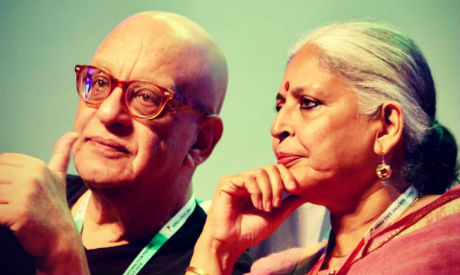
Egyptian filmmaker Khairy Beshara with Beena Paul, Indian film editor and artistic director of the 24th International Film Festival of Kerala (Photo: Khairy Beshara Twitter account / Rijas Galleria)
Egyptian filmmaker Khairy Beshara heads the jury panel of the 24th International Film Festival of Kerala, India, running between 6 and 13 December.
In addition to his tasks in the jury panel for the festival's competitive section which is limited to films from Asia, Africa and Latin America, Beshara also held a discussion hosted by Resul Pookutty, Indian sound editor, during which he spoke about his journey in cinema.
The jury decides the winners in four categories offering The Golden Crow Pheasant Award for the Best Feature Film to be shared equally between the director and producer; The Silver Crow Pheasant Award for the Best Director; The Best Debut Director Award in addition to a prize to the director of a film voted as the Best Entry in Competition by the festival delegates.
Active in the film industry since the 1970s, Beshara is one of the creators of new Egyptian Realism, which became a cinematic trend in the 1980s. In this context, three of Beshara's movies -- The Collar and the Bracelet (1985), Bitter Day, Sweet Day (1988), and Ice Cream in Gleem (1993) -- were listed in the book 100 Films in the History of Egyptian Cinema, published by the Bibliotheca Alexandrina, Alexandria.
Born in 1947 and a graduate of the Egyptian Higher Institute of Cinema (1976) and the Film Institute in Poland (where he was on a two-year fellowship), he launched his career with several documentaries -- Tanks Hunter (1974), The Village Doctor (1975), Illumination (1977), The Talk of the Rocks (1978), Surpassing Despair (1980), among others -- before moving on to feature narrative movies. The latter ones include Bloody Destinies (1982, Egyptian-Algerian co-production); House Boat No. 70 (1982); The Collar and the Bracelet (1985); Crab (Kaboria, 1990); America Abracadabra (America Shika Bika, 1993); Strawberry War (1993); Nutshell (1995); A Night on The Moon (2008), which is a digital film transferred to 35mm; and Moondog (2012).
Beshara is one of the first Egyptian and Arab directors to venture into digital filmmaking in the late 1990s.
His short documentary films often explore a variety of children and women's rights and underprivileged communities' issues, such as female genital mutilation, children's rights, people with special needs, environmental protection, and training for employment.
The filmmaker has a numerous television series in his account: Habiba's Heart (2005), Zaat (Self, 2012, episodes from 17 to 30), The People of Alexandria (2014), The Flood (2017), Karma's Curse (2018), among others.
Beshara lectures at Cairo's Higher Institute of Cinema.
For more arts and culture news and updates, follow Ahram Online Arts and Culture on Twitter at @AhramOnlineArts and on Facebook at Ahram Online: Arts & Culture
Short link: